|
|
|
Sort Order |
|
|
|
Items / Page
|
|
|
|
|
|
|
| Srl | Item |
| 1 |
ID:
100962
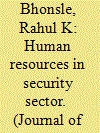

|
|
|
|
|
| Publication |
2010.
|
| Summary/Abstract |
The challenge of management of human resources may be the most profound in the security sector in the years ahead given transformations happening globally and enhancement of human potential and opportunities for individual growth. The national security sector extending from the military to private security guards denotes the plethora of skills sets required which vary from that of handling highly sophisticated and lethal missile arsenal, to commandeering large aircraft carriers and submarines to securing public space in metropolitan cities. Selection, training, motivation and incentivizing the force will be a major challenge for the 21st Century. The need of the hour is, therefore, to have an integrated human resource development policy so that lateral skills can be utilized across the three spectrums of defence, paramilitary and police and private security and enhance talent utilization through motivation. It argues that this will lead to effective and economic utilization of manpower with national ownership rather than as a stove piped resource, corresponding savings to the ex-chequer while adding to proficiency of security forces.
|
|
|
|
|
|
|
|
|
|
|
|
|
|
|
|
| 2 |
ID:
170993
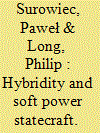

|
|
|
|
|
| Summary/Abstract |
This examination analyses transformations to statecraft accelerated by digital media technologies. This theory-building study moves beyond digitalisation of diplomacy as a means of adapting statecraft to evolving media landscapes, and extends to the governance of soft power capabilities. It challenges static approaches to digital diplomacy and argues for conceptualisations of soft power that account for changes to statecraft. To theorise this dynamic, the concept of ‘soft power statecraft’ and the notion of hybridity in the analysis of ‘GREAT’, Britain’s prominent strategic campaign, reveal trajectories of change elicited by it. The findings, drawn from interviews, policy data, and media artefacts, reveal how ‘GREAT’ embodies a hybridised approach to soft power statecraft at the levels of governance, communicative practices, media landscapes, and cultures. They reveal how these changes translate into statecraft strategies for the articulation of soft power.
|
|
|
|
|
|
|
|
|
|
|
|
|
|
|
|
| 3 |
ID:
147330
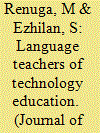

|
|
|
|
|
| Summary/Abstract |
This study looked at the challenges, needs and transformations of the technology education language teachers who responded to questionnaires and extensive interviews. In total, 88 teachers from 20 institutions, heads of English departments and placement professionals of engineering institutions were involved in the study. It was found that hands-on communication and soft skills training in industry was the uppermost need. The lack of industry exposure and opportunities to articulate is the highest challenge. The heads of department revealed that industrial collaboration is the highest priority. The placement professionals made the point that institutions need to develop communication skills with respect to the current trends in industry.
|
|
|
|
|
|
|
|
|
|
|
|
|
|
|
|
| 4 |
ID:
137335
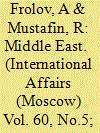

|
|
|
|
|
| Summary/Abstract |
The Ukrainian crisis eclipsed the Middle East and the Arab revolutions which, however, have not disappeared without trace. Seemingly identical and deceptively monochrome, they rolled across the Arab world revealing their specifics and bringing very different results ranging from a backtrack revolution in Egypt to chaos and instability in Libya, from the regime's firmer grip on power in Yemen, to what looks like chronic confrontation in Syria and a complete failure in Bahrain. The Middle East has come close to the threshold of modernization of social relations and the style of governance, even though there is a widely accepted opinion that in 2013 the revolutions exhausted their vigor.
|
|
|
|
|
|
|
|
|
|
|
|
|
|
|
|
| 5 |
ID:
137257
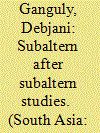

|
|
|
|
|
| Summary/Abstract |
Few scholars of my generation with an interest in South Asian and Post-Colonial Studies have escaped the influence of Subaltern Studies. Many of us chose a research trajectory that fortuitously offered opportunities to work in proximity with members of the Subaltern Studies collective. By the time I began my graduate work on caste and Dalit studies at the Australian National University (ANU) in Canberra in the late 1990s, Ranajit Guha had already stepped down as editor of Subaltern Studies and his celebrated six volumes had become part of global academic lore. Reading these volumes as a fresh college lecturer in Mumbai in the early 1990s played no small part in my decision to undertake my graduate training in Canberra. Guha, after all, was based at ANU as a senior research fellow at the erstwhile Research School of Pacific and Asian Studies (RSPAS). He had moved there in 1980 from the UK and lived in Canberra for the next two decades, in effect conferring on ANU the distinction of being the academic home from which the classic volumes of Subaltern Studies emanated—a fact, perhaps, little known to a new generation of post-colonial scholars globally. Dipesh Chakrabarty, an alumnus of ANU, had already moved to the University of Chicago. But he had a visiting appointment at the Humanities Research Centre that adjoined the Literature Department in ANU's famous A.D. Hope Building. Given my disciplinary base in the literature programme, I soon got to meet them both through formal introductions by the chair of my panel, Jon Mee.
|
|
|
|
|
|
|
|
|
|
|
|
|
|
|
|
|
|
|
|
|